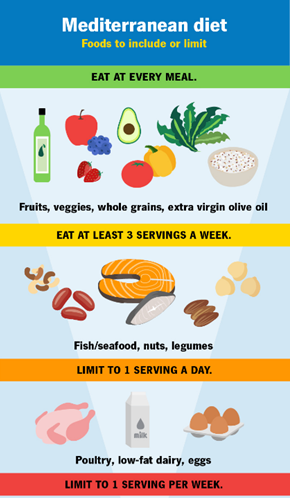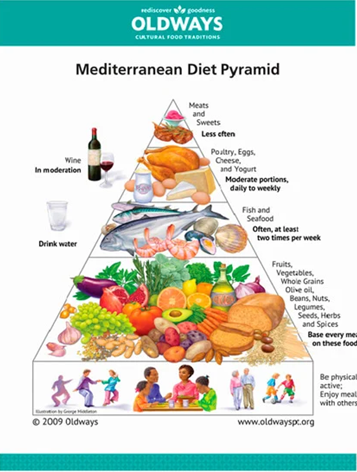By Aggeliki Giannakoulia and Nagia Gourdoupi
It is widely recognized that nowadays, a healthy diet provides us with a variety of benefits. It is very important that everyone follows a healthy diet, which involves not only consuming nutritious foods and beverages but also adopting a healthy lifestyle. For example, exercising on a daily basis boosts our metabolism and, consequently, our physical and mental health. Many scientists have previously stated in their research that the diet-key that offers all the above is the “Mediterranean Diet”.
The Mediterranean Diet, as a prime example of a healthy diet, is something everyone should be aware of. As far as it concerns the foods included in the diet, the main idea is to incorporate foods rich in fiber into at least one of your meals. More specifically the quantity of fruits, vegetables, fish, nuts, legumes, olive oil and dairy products must be increased. In addition, there are some categories of foods that have to be avoided in order to properly follow this diet. Those are fried foods, fatty or processed meats, pastries, sugary drinks, beer or liquor, foods high in sodium or saturated fat, refined carbohydrates, like white bread and white rice and highly processed foods, like some cheeses. It is important that all of the above be followed in moderation to avoid creating any additional problems in our bodies.
However, the Mediterranean Diet is not just a diet, it is a way of life as it has already been stated earlier. Therefore, this lifestyle encapsulates essential components of both a balanced diet and a healthy life. These include frugality and moderation in food consumption, the use of seasonal and traditional products, a focus on locally sourced, eco-friendly, and biodiverse items, personal engagement in culinary preparation, and an emphasis on conviviality and social activities during meals. Additionally, it encourages regular physical activity, adequate hydration, and sufficient rest. The interconnections between the various aspects of the Mediterranean Diet are key pillars that reflect the Mediterranean region’s distinctive lifestyle, highlighting how each element is a necessary part of the others. Finally, the seamless integration of social involvement, sufficient rest, regular physical exercise and diet are parts of the Mediterranean Diet that provide us with a holistic view of the Mediterranean lifestyle and its inherent harmony.
In conclusion, the Mediterranean Diet is a well-known diet worldwide and has encouraged many people to adopt a healthy lifestyle with its benefits. As research has shown, the Mediterranean Diet offers numerous benefits and has helped many people, especially those at risk for heart disease. Beyond protecting your heart, the Mediterranean Diet can help you prevent or manage many other conditions, such as diabetes or high blood pressure. Therefore, UNESCO has rightfully designated the Mediterranean Diet as a «world cultural heritage for humanity». It should be noted that this specific diet may not be suitable for everyone, as each individual has different needs. However, what we should all remember is that maintaining a healthy lifestyle and consuming nutritious foods daily is key to a happy and healthy life.
Sources:
- https://elde.gr/diatrofi-kai-psuxiki-ugeia/
- https://www.oloygeia.gr/diatrofi/mesogeiaki-diatrofi-7imero-programma-diatrofis-gia-apoleia-varoys/
- https://pubmed.ncbi.nlm.nih.gov/38424420/
https://my.clevelandclinic.org/health/articles/16037-mediterranean-diet





